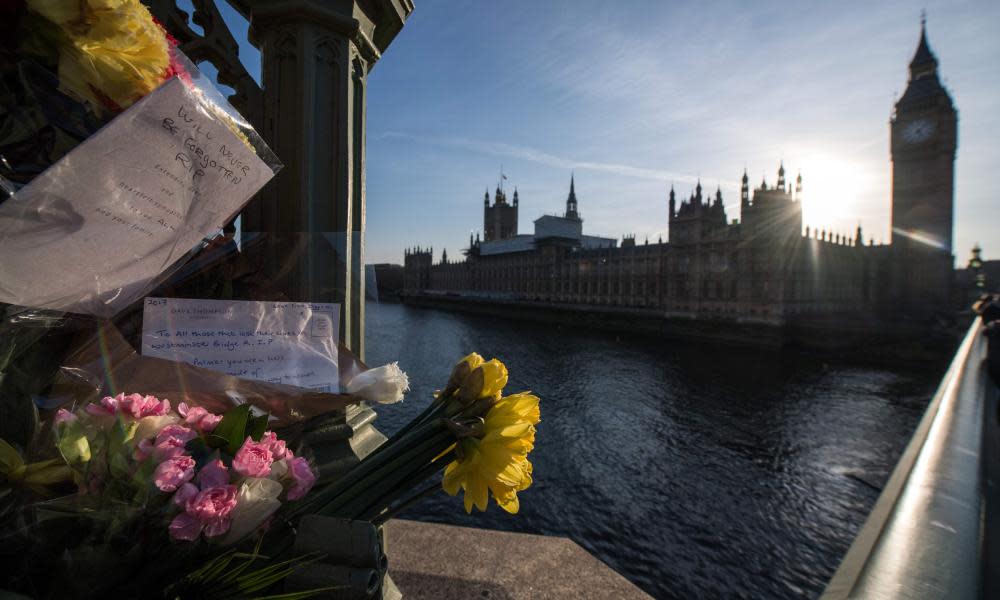Security chief told MPs they were safe in parliament before attack

MPs were told by one of parliament’s top officials that their security was fine as long as they were within the Palace of Westminster, just 24 hours before an attacker managed to breach its perimeter fence and stab a police officer to death.
Eric Hepburn, parliament’s director of security, gave evidence to MPs that the “real vulnerability” for members of parliament was in their constituencies.
“In terms of members’ security, within parliament itself we are in a very good position,” he told the home affairs committee on Tuesday. “We have put the right mitigations in place, so that when members of parliament are here, that is fine.”
However, safety precautions within parliament are under huge scrutiny after an attacker, named as Khalid Masood, managed to enter the Carriage Gates entrance on Parliament Square without being apprehended by an armed patrol.
He stabbed PC Keith Palmer, an unarmed officer, to death before being shot by a bodyguard of Michael Fallon, the defence secretary, whose car happened to be parked metres away.
At the time, MPs were passing through the cloisters between Portcullis House and the main parliament building on their way to vote, while Theresa May was in a voting lobby. There are several routes to the House of Commons chamber area without needing to use a security pass to go through locked doors, although police are stationed on those routes.
Footage emerged on Friday showing the prime minister uncertain of which way to go as she was ushered out by her protection officers.
Security expert Prof Anthony Glees said the attack had demonstrated a “lack of protection” within parliament, while there was a “disturbing signs of chaos” in the way May was taken away from the estate.
The head of the Centre for Security and Intelligence Studies programme at the University of Buckingham said: “We’ve got complacent partly because the security threat has been at severe for such a long time and partly because we are putting our faith in a system simply not fit for purpose in the 21st century, if one compares it to other modern parliaments.
“It is clear that Masood got within 100 metres of the prime minister. If he had been wearing a suicide vest, he would have caused very extensive damage. Luckily he wasn’t but nobody knew that he wasn’t. If you add all those things together, we should not have what is in effect the main entrance to parliament looked after by a policeman who is unarmed.”
The parliamentary authorities have previously been warned about the potential vulnerability of Carriage Gates. Around 5,000 people work on the estate and about 14,000 people hold parliamentary passes, while hundreds of visitors also come to the building each day.
Tom Brake, a Liberal Democrat former deputy leader of the House of Commons who is a member of the Commons Commission, revealed works to improve the Carriage Gates entrance were due to take place after a security review in a project called the New Palace Yard Security Enhancement.
“Regrettably those works had not actually taken place,” he said.
It is also understood some “penetration testing of the perimeter physical security” had taken place in recent times, with a number of vulnerabilities identified.
May defended security arrangements at parliament on Thursday, saying the UK should be clear that the attacker was unsuccessful at gaining access to the building.
“The police heroically did their job,” she said. “But, as is routine, the police, together with the house authorities, are reviewing the security of the parliamentary estate, coordinated with the Cabinet Office, which has responsibility for the security measures in place around the government secure zone.
“All of us in this house have a responsibility for the security and safety of our staff, and advice is available for members who need it.”
She said security had improved considerably in her 20 years as an MP.
Fallon was pressed on why an unarmed officer was the first line of defence. He said: “Obviously the security arrangements of the Commons will now be reviewed.
“Parliament can’t be hermetically sealed. People come in and out all the time. We have visitors, quite rightly, we are the home of democracy. Our constituents see us.”

 Yahoo News
Yahoo News 
